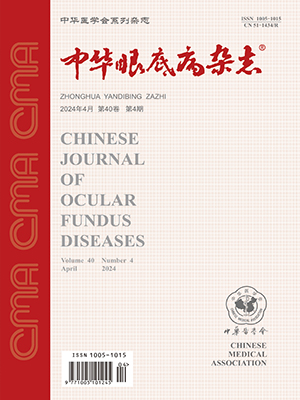| 1. |
Berger W, Kloeckener-Gruissem B, Neidhardt J. The molecular basis of human retinal and vitreoretinal diseases[J]. Prog Retin Eye Res, 2010, 29(5): 335-375. DOI: 10.1016/j.preteyeres.2010.03.004.
|
| 2. |
Vázquez-Domínguez I, Garanto A, Collin RWJ. Molecular therapies for inherited retinal diseases-current standing, opportunities and challenges[J]. Genes (Basel), 2019, 10(9): 654. DOI: 10.3390/genes10090654.
|
| 3. |
Eichler EE. Genetic variation, comparative genomics, and the diagnosis of disease[J]. N Engl J Med, 2019, 381(1): 64-74. DOI: 10.1056/NEJMra1809315.
|
| 4. |
Richards S, Aziz N, Bale S, et al. Standards and guidelines for the interpretation of sequence variants: a joint consensus recommendation of the American College of Medical Genetics and Genomics and the Association for Molecular Pathology[J]. Genet Med, 2015, 17(5): 405-424. DOI: 10.1038/gim.2015.30.
|
| 5. |
王秋菊, 沈亦平, 陈少科, 等. 遗传变异分类标准与指南[J]. 中国科学 (生命科学), 2017, 47(6): 668-688. DOI: 10.1360/N052017-00099.Wang QJ, Shen YP, Chen SK, et al. Standards and guidelines for the interpretation of sequence variants[J]. Science in China (Series C), 2017, 47(6): 668-688. DOI: 10.1360/N052017-00099.
|
| 6. |
Abou Tayoun AN, Pesaran T, DiStefano MT, et al. Recommendations for interpreting the loss of function PVS1 ACMG/AMP variant criterion[J]. Hum Mutat, 2018, 39(11): 1517-1524. DOI: 10.1002/humu.23626.
|
| 7. |
Lewis BP, Green RE, Brenner SE. Evidence for the widespread coupling of alternative splicing and nonsense-mediated mRNA decay in humans[J]. Proc Natl Acad Sci USA, 2003, 100(1): 189-192. DOI: 10.1073/pnas.0136770100.
|
| 8. |
Chang YF, Imam JS, Wilkinson MF. The nonsense-mediated decay RNA surveillance pathway[J]. Annu Rev Biochem, 2007, 76: 51-74. DOI: 10.1146/annurev.biochem.76.050106.093909.
|
| 9. |
Corradi Z, Salameh M, Khan M, et al. ABCA4 c. 859-25A>G, a frequent palestinian founder mutation affecting the intron 7 branchpoint, is associated with early-onset Stargardt disease[J]. Invest Ophthalmol Vis Sci, 2022, 63(4): 20. DOI: 10.1167/iovs.63.4.20.
|
| 10. |
Martin-Merida I, Sanchez-Alcudia R, Fernandez-San Jose P, et al. Analysis of the PRPF31 gene in Spanish autosomal dominant retinitis pigmentosa patients: a novel genomic rearrangement[J]. Invest Ophthalmol Vis Sci, 2017, 58(2): 1045-1053. DOI: 10.1167/iovs.16-20515.
|
| 11. |
Cremers FPM, Lee W, Collin RWJ, et al. Clinical spectrum, genetic complexity and therapeutic approaches for retinal disease caused by ABCA4 mutations[J/OL]. Prog Retin Eye Res, 2020, 79: 100861[2020-04-09]. https://pubmed.ncbi.nlm.nih.gov/32278709/. DOI: 10.1016/j.preteyeres.2020.100861.
|
| 12. |
Tian L, Chen C, Song Y, et al. Phenotype-based genetic analysis reveals missing heritability of ABCA4-related retinopathy: deep intronic variants and copy number variations[J]. Invest Ophthalmol Vis Sci, 2022, 63(6): 5. DOI: 10.1167/iovs.63.6.5.
|
| 13. |
Parfitt DA, Lane A, Ramsden CM, et al. Identification and correction of mechanisms underlying inherited blindness in human iPSC-derived optic cups[J]. Cell Stem Cell, 2016, 18(6): 769-781. DOI: 10.1016/j.stem.2016.03.021.
|
| 14. |
Sangermano R, Khan M, Cornelis SS, et al. ABCA4 midigenes reveal the full splice spectrum of all reported noncanonical splice site variants in Stargardt disease[J]. Genome Res, 2018, 28(1): 100-110. DOI: 10.1101/gr.226621.117.
|
| 15. |
Khan M, Arno G, Fakin A, et al. Detailed phenotyping and therapeutic strategies for intronic ABCA4 variants in Stargardt disease[J]. Mol Ther Nucleic Acids, 2020, 21: 412-427. DOI: 10.1016/j.omtn.2020.06.007.
|
| 16. |
Zampaglione E, Kinde B, Place EM, et al. Copy-number variation contributes 9% of pathogenicity in the inherited retinal degenerations[J]. Genet Med, 2020, 22(6): 1079-1087. DOI: 10.1038/s41436-020-0759-8.
|
| 17. |
Ellingford JM, Barton S, Bhaskar S, et al. Whole genome sequencing increases molecular diagnostic yield compared with current diagnostic testing for inherited retinal disease[J]. Ophthalmology, 2016, 123(5): 1143-1150. DOI: 10.1016/j.ophtha.2016.01.009.
|
| 18. |
Di Scipio M, Tavares E, Deshmukh S, et al. Phenotype driven analysis of whole genome sequencing identifies deep intronic variants that cause retinal dystrophies by aberrant exonization[J]. Invest Ophthalmol Vis Sci, 2020, 61(10): 36. DOI: 10.1167/iovs.61.10.36.
|
| 19. |
Tian L, Sun T, Xu K, et al. Screening of BEST1 gene in a Chinese cohort with best vitelliform macular dystrophy or autosomal recessive bestrophinopathy[J]. Invest Ophthalmol Vis Sci, 2017, 58(9): 3366-3375. DOI: 10.1167/iovs.17-21999.
|
| 20. |
Xiao T, Xie Y, Zhang X, et al. Variant profiling of a large cohort of 138 Chinese families with autosomal dominant retinitis pigmentosa[J/OL]. Front Cell Dev Biol, 2021, 8: 629994[2021-02-01]. https://pubmed.ncbi.nlm.nih.gov/33598457/. DOI:10.3389/fcell.2020.629994.
|




